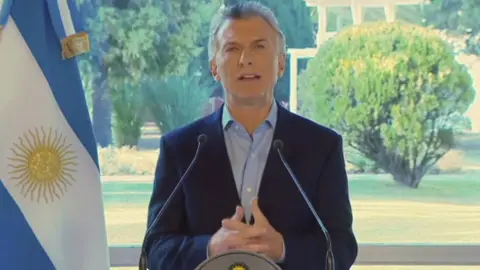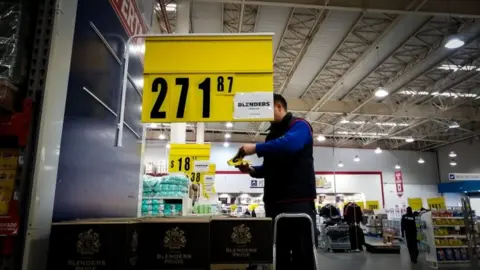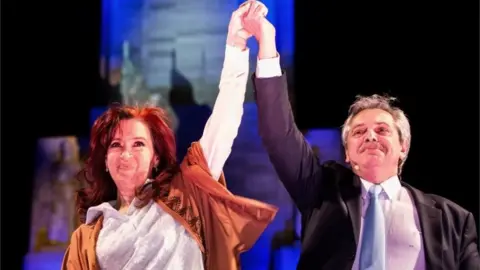Argentina's Macri unveils economic 'relief' measures after poll shock
 AFP
AFPArgentine President Mauricio Macri has announced a series of "relief" measures, days after a defeat at the polls triggered economic turmoil.
In a televised speech, he announced income tax cuts and increases in welfare subsidies. Petrol prices will be frozen for 90 days, he added.
Mr Macri said the measures would help 17 million workers.
The move comes after opposition centre-left candidate Alberto Fernández won presidential primaries at the weekend.
The result dealt a severe blow to Mr Macri's chances of re-election. On Monday, the Argentine peso and stock markets plunged over concerns that Mr Fernández could take Argentina back to populist economic policies.
The peso fell again on Wednesday following President Macri's attempts to shore up support.
Mr Macri was elected in 2015 pledging to boost Argentina's ailing economy with liberal economic reforms.
But a recovery has yet to materialise and more than a third of the population is living in poverty. Tough austerity measures have pushed up prices for public services and dented Mr Macri's popularity.
Argentina is currently in recession and posted 22% inflation for the first half of the year, one of the highest rates globally.
What did President Macri say?
"The measures I take and that I am going to share with you now are because I listened to you. I heard what you wanted to tell me on Sunday," he said during his eight-minute nationwide broadcast.
"These are measures that will bring relief to 17 million workers and their families."
 EPA
EPAPresident Macri said tax cuts would see workers in the private sector receiving an extra 2,000 pesos (£28; $33) a month until the end of the year and public sector workers an extra 5,000 pesos. He said the minimum wage would also rise.
Mr Macri said he took responsibility for the election result and recognised that many voters were "tired and angry". He said he was willing to talk to the opposition, adding that it was "clear that political uncertainty has caused a lot of damage".
"I understand your anger, your tiredness. I just ask you not to doubt the work we did together because there is so much, and there is too much at stake," he said.
How did the latest crisis unfold?
The primary election, in which presidential candidates from all parties take part, was won by Mr Fernández by a wide margin. The coalition backing Mr Fernández took 47.7% of the vote while the bloc supporting Mr Macri had 32.1%.
Mr Fernández is now seen as the frontrunner for October's presidential election. His running mate is former President Cristina Fernández de Kirchner, who presided over an administration remembered for a high degree of protectionism and heavy state intervention in the economy.
 AFP
AFPIn trading on Monday, the peso initially plunged 30% against the dollar to a record low before rallying to about 15%.
Some of the country's most traded stocks also lost about half of their value in one day.
At end of trading on Monday, Argentina's main Merval index closed down 31% as some of the country's largest companies saw their market values plummet.
On Wednesday, after Mr Macri's broadcast, the peso fell again, trading at 60.77 to the dollar - a further 4% down from Tuesday's close.

